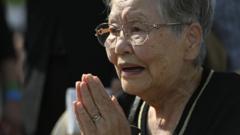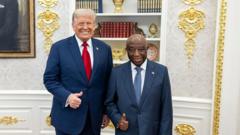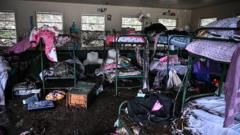As survivors reflect on the lasting impact of the Hiroshima bombing, calls for nuclear disarmament resonate louder than ever.
Hiroshima Commemorates 80 Years Since Devastating Atomic Bombing

Hiroshima Commemorates 80 Years Since Devastating Atomic Bombing
Global leaders gather in remembrance, emphasizing the urgent need to address the dangers of nuclear proliferation.
On Wednesday, Hiroshima observed the somber milestone of 80 years since the atomic bomb was unleashed on the city by the United States. Japanese Prime Minister Shigeru Ishiba, along with dignitaries from various nations and Mayor Kazumi Matsui, participated in a moment of silence to honor the victims. Mayor Matsui issued a poignant warning about the rising military build-up globally, condemning the belief that nuclear arms are necessary for national security, highlighting a critical failure to heed historical lessons.
The catastrophic event that marked the end of World War II resulted in the deaths of over 200,000 people, many succumbing to the immediate effects of the explosion or battling radiation sickness long after. The haunting legacy of that fateful day continues to affect survivors. Shingo Naito, who lost family members to the blast, shared his harrowing story with students in Hiroshima, who are translating his experiences into artistic expressions of remembrance.
In a nod to the collective memory and ongoing struggle against nuclear weapons, the group Nihon Hidankyo, comprised of those who survived the bomb, was awarded the Nobel Peace Prize in 2024. In his address, Mayor Matsui criticized the nuclear Non-Proliferation Treaty as being on the verge of failure and urged the Japanese government to endorse the Treaty on the Prohibition of Nuclear Weapons, effective since 2021.
Despite over 70 nations supporting the treaty, major nuclear powers, including the US and Russia, have resisted its terms, citing the strategic necessity of their arsenals. Japan finds itself in a complex position, as its security strategy hinges on US nuclear capabilities.
The division surrounding nuclear policy is palpable across Japan, with protests advocating for the eradication of these weapons near the Peace Memorial Park. Fellow survivor Satoshi Tanaka articulated a poignant connection between current global conflicts in places like Gaza and Ukraine and the trauma experienced during Hiroshima. He expressed a compelling call for nuclear-armed nations to recognize their responsibilities, urging global citizens to raise their voices against the proliferation of such devastating weapons.
The catastrophic event that marked the end of World War II resulted in the deaths of over 200,000 people, many succumbing to the immediate effects of the explosion or battling radiation sickness long after. The haunting legacy of that fateful day continues to affect survivors. Shingo Naito, who lost family members to the blast, shared his harrowing story with students in Hiroshima, who are translating his experiences into artistic expressions of remembrance.
In a nod to the collective memory and ongoing struggle against nuclear weapons, the group Nihon Hidankyo, comprised of those who survived the bomb, was awarded the Nobel Peace Prize in 2024. In his address, Mayor Matsui criticized the nuclear Non-Proliferation Treaty as being on the verge of failure and urged the Japanese government to endorse the Treaty on the Prohibition of Nuclear Weapons, effective since 2021.
Despite over 70 nations supporting the treaty, major nuclear powers, including the US and Russia, have resisted its terms, citing the strategic necessity of their arsenals. Japan finds itself in a complex position, as its security strategy hinges on US nuclear capabilities.
The division surrounding nuclear policy is palpable across Japan, with protests advocating for the eradication of these weapons near the Peace Memorial Park. Fellow survivor Satoshi Tanaka articulated a poignant connection between current global conflicts in places like Gaza and Ukraine and the trauma experienced during Hiroshima. He expressed a compelling call for nuclear-armed nations to recognize their responsibilities, urging global citizens to raise their voices against the proliferation of such devastating weapons.






















